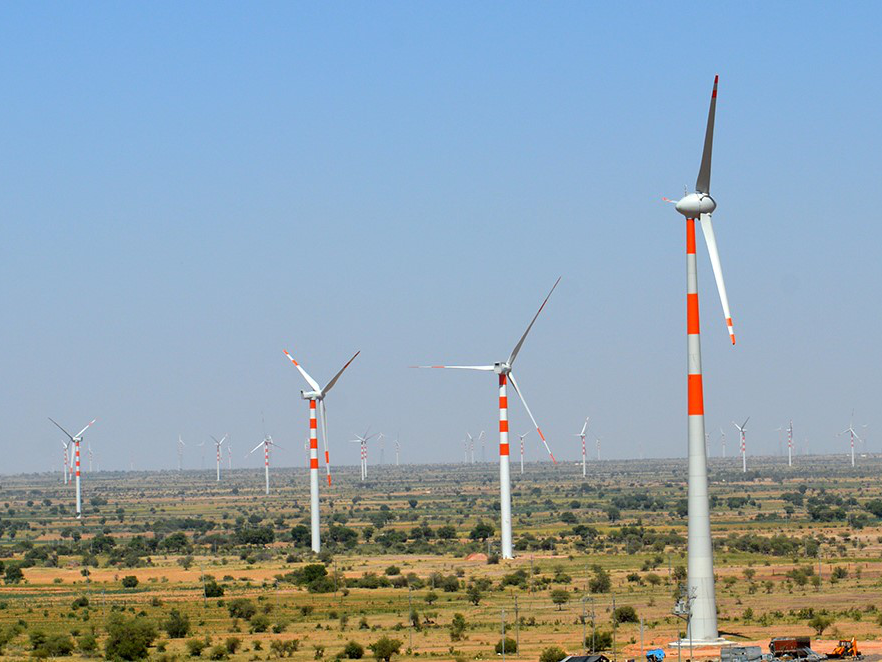What is Ostro Energy?
Ostro Energy (now incorporated into ReNew) was an Indian renewables platform with diversified geographical spread; good quality infrastructure; stable cash flows; and long term PPAs.
Context
With frequent energy shortages and national decarbonisation goals driving a favourable regulatory framework, India represents an extremely attractive market for renewable energy. Low-cost development, a preferential tariff regime, as well as coal and gas shortages, mean that wind is fast becoming an essential component of the energy generation mix.
The Actis approach
Actis is a global investor in sustainable infrastructure doing what it does best: creating replicable deals in high-growth sectors that meet the increasing demand for sustainable domestic infrastructure. Our approach to Ostro followed the same model as our previous energy investments – Chile’s Aela Energía, Brazil’s Atlantic Energias Renováveis and Mexico’s Zuma Energía – all of which feature renewable generation platforms built around a buy-and-build thesis.
As with Actis’ other energy ventures, detailed sector knowledge and local intelligence had a vital part to play. India is a complex market, so a strong on-the-ground presence coupled with a sound understanding of the regulatory mechanisms was vital to monitor project execution.
What did we do?
In August 2014, Actis committed $180m to establish Ostro. We backed two high calibre individuals to lead the business (who became Ostro’s CEO and COO) and assembled a promising pipeline of projects. Within a year of establishing the business, we had created a fully-functioning company with a team of more than 50 people and approximately 100MW under construction in projects in Tejuva and Rajgarh, both in Rajasthan, along with a strong pipeline of projects.
By the time we exited the investment in 2018, final contracted capacity had reached 1,108MW, of which 858MW was already operating and 250MW was under construction. In addition, the platform had an additional auction-ready pipeline of 2,000MW, which was a significant attraction for the buyer. Our total investment over the period was $280m.
Building a Sustainability Leader
As with Ostro, many of Actis’ energy investments are wholly-owned platforms. We are therefore able to appoint a Head of Sustainability at the platform level and to establish a Sustainability sub-committee to the Board. In 2014, we helped Ostro’s management recruit a high calibre Head of Sustainability to effectively manage sustainability challenges and build sustainability-related value.
Actis is a global investor in sustainable infrastructure doing what it does best: creating replicable deals in high-growth sectors that meet the increasing demand for sustainable domestic infrastructure
Ostro experienced a range of sustainability challenges which are common in high-growth markets such as India including a lack of established standards for workers’ accommodation, poor labour conditions, and limited access to safe drinking water and sanitation.
To help tackle labour challenges, we created a Labour Accommodation Standards Policy, based on international best practice. Crucially, Ostro ensured that this forms part of any agreement with its contractors. Along similar lines, the company also developed a Security/Human Rights Protocol in line with UN voluntary guidelines.
Actis’ ownership of Ostro also offered the opportunity to deliver better outcomes for local stakeholders in other ways. For example, Rajasthan is not only one of India’s largest states, it is also one of its driest. Access to drinking water is a major challenge, compounded by the fact that the groundwater in Rajasthan has a naturally-occurring high fluoride content, which causes wide-spread fluoride poisoning across the state. Ostro deployed its resources to find an effective solution to provide safe drinking water. In addition to constructing water tanks, a more modern and innovative solution was formulated – a solar-powered water dispensing ATM. The ATMs run 24/7 and use reverse osmosis and UV to purify water. The ATMs are cloud connected, enabling Ostro’s Head of Sustainability to remotely track the volumes of water dispensed, as well as the number of families who benefitted from the machines.
In the Tejuva region (a rural area where villagers have limited access not just to water, but to healthcare and primary education), the Tejuva development team also partnered with local NGOs to implement a range of community development programmes to help address the needs of these local communities.
Ostro also focused on improving health and safety by focusing on staff safety training. For example, between March 2015 and April 2016 alone, workers undertook 2,120 hours of safety training. As a result, 301 hazards were identified and corrected, and not a single hour of lost time was recorded due to injury.
How values drove value
Actis exited the investment in March 2018. Under our ownership, the platform successfully invested in 14 projects across India, achieving its business plan target of 1GW within four years, ahead of schedule. As well as building a highly attractive portfolio of renewables projects, we ensured the company was prepared for comprehensive due diligence conducted by the large group of strategic and financial purchasers during the exit process. The competition for an institutional quality renewable power company, built with robust sustainability practices, resulted in a highly successful exit in 2018.
The future
Ostro built an impressive business with a diversified geographical spread and good quality infrastructure, meaning it was well placed to help meet India’s future energy needs. Actis meanwhile remains committed to Indian energy infrastructure and is continuing to invest in this sector through its subsequent platforms and funds.
